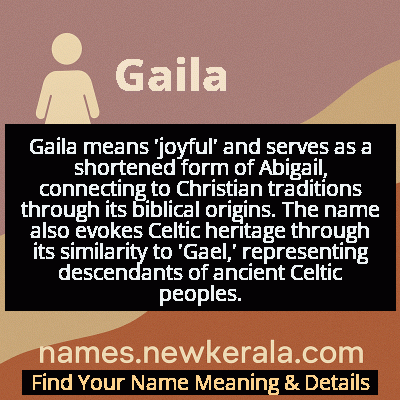Gaila Name Meaning & Details
Origin, Popularity, Numerology Analysis & Name Meaning of Gaila
Discover the origin, meaning, and cultural significance of the name GAILA. Delve into its historical roots and explore the lasting impact it has had on communities and traditions.
Name
Gaila
Gender
Female
Origin
Christian
Lucky Number
3
Meaning of the Name - Gaila
Gaila means 'joyful' and serves as a shortened form of Abigail, connecting to Christian traditions through its biblical origins. The name also evokes Celtic heritage through its similarity to 'Gael,' representing descendants of ancient Celtic peoples.
Gaila - Complete Numerology Analysis
Your Numerology Number
Based on Pythagorean Numerology System
Ruling Planet
Jupiter
Positive Nature
Optimistic, inspirational, and creative.
Negative Traits
Scattered, exaggerating.
Lucky Colours
Yellow, gold, purple.
Lucky Days
Thursday.
Lucky Stones
Yellow sapphire.
Harmony Numbers
1, 2, 9.
Best Suited Professions
Arts, writing, communication.
What People Like About You
Creativity, optimism.
Famous People Named Gaila
Gaila Moss
Fictional Character
Character in Star Trek franchise, an Orion science officer
Gaila Gonzales
Musician
American singer and songwriter blending folk and pop influences
Gaila Koval
Community Leader
Jewish community organizer and philanthropist in early 20th century New York
Name Variations & International Equivalents
Click on blue names to explore their detailed meanings. Gray names with will be available soon.
Cultural & Historical Significance
The name's evolution reflects broader cultural exchanges between different ethnic and religious groups. In Christian contexts, it represents the continuity of Old Testament traditions while allowing for cultural adaptation. For families with Celtic ancestry, it provides a way to honor their heritage while maintaining Christian naming conventions. The name's joyful meaning has made it particularly appealing in communities that value positive, uplifting names with deep historical roots. This cultural flexibility has allowed Gaila to maintain relevance across generations and geographical boundaries.
Extended Personality Analysis
Individuals named Gaila are often perceived as joyful, energetic, and socially vibrant personalities. The name's meaning of 'joyful' seems to manifest in their character through an optimistic outlook and ability to bring happiness to others. They typically possess strong communication skills and natural charm, making them effective in social situations and often the center of their social circles. Their connection to the Abigail root suggests qualities of wisdom and practical intelligence, while the Celtic Gael influence may contribute to a sense of cultural pride and strong family connections.
Gailas are often described as resilient and adaptable, able to navigate different social contexts with ease. They tend to be creative problem-solvers who approach challenges with enthusiasm rather than apprehension. Their joyful nature doesn't preclude depth, however; many Gailas demonstrate significant emotional intelligence and capacity for meaningful relationships. The combination of biblical heritage and Celtic spirit often results in individuals who are both spiritually grounded and culturally aware, with a natural ability to connect with diverse groups of people. They frequently excel in roles that require both interpersonal skills and cultural sensitivity, making them effective in fields like education, counseling, community organizing, and the arts.
Modern Usage & Popularity
In contemporary times, Gaila maintains moderate usage primarily within Christian communities and families with Celtic heritage. While not among the most popular names, it enjoys steady use as a distinctive alternative to more common biblical names. The name saw increased attention following its appearance in the Star Trek franchise, introducing it to wider audiences. Current naming trends show Gaila being chosen by parents seeking names that are familiar yet uncommon, with strong cultural and religious significance. It's particularly popular among families wanting to honor both Hebrew and Celtic ancestry, serving as a bridge between these rich traditions. The name's joyful meaning makes it appealing to modern parents who value positive attributes in name selection, and its relative rarity ensures it stands out without being overly unconventional.
Symbolic & Spiritual Meanings
Symbolically, Gaila represents the convergence of joy, heritage, and spiritual connection. The name embodies the concept of joyful inheritance, suggesting that happiness and cultural legacy are intertwined. As an abbreviation of Abigail, it carries the symbolic weight of biblical wisdom and feminine strength, while its connection to 'Gael' symbolizes enduring cultural identity and ancestral pride. The name can be seen as representing the bridge between ancient traditions and contemporary life, between spiritual heritage and personal joy. Symbolically, it suggests that true joy comes from understanding one's roots while embracing the present. The name also carries connotations of celebration and festivity, reminiscent of Gaelic cultural gatherings and the joyful spirit of community that characterizes both Celtic and Christian traditions.

